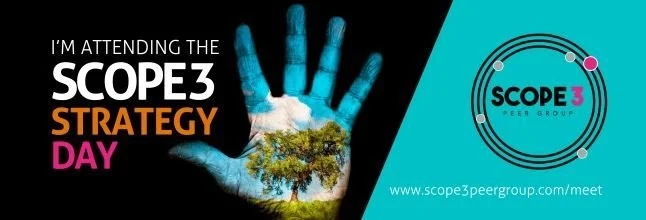Last week the Scope 3 Peer Group ‘strategy days’ saw several hundred sustainability and procurement professionals congregating at the Sustainable Ventures venue (an interesting story there in itself) within the old London County Hall on the south bank of the Thames.
The Peer Group is a ‘cross-industry, global collective of those tasked with supply chain emissions reduction’. It has over 2000 members now and aims to support faster and more confident action in a confusing space, signposting, and benchmarking and sharing best practice. So the first day (Tuesday) was given over to industry based groups (NHS, Pharma etc), Wednesday was a more conventional ‘plenary’ conference, and Thursday (when I attended) saw about fifteen topic-based sessions, with three running in parallel through the day.
Oliver Hurrey, the founder of the Group, says he always wants to make as much as possible available free of charge, so only the middle day was a paid-for event, which was good news for cash-strapped public sector organisations amongst others! The other two days were free – and oversubscribed, with some 400 people registered for Thursday. (Maybe there is a lesson there for other event organisers such as the Chartered Institute of Procurement and Supply?) But over 200 people also registered for the paid session, a sign of the success of the Group and the interest in the topic of Scope 3 carbon emissions, and how organisations can measure, manage and reduce them.
The Thursday sessions were scheduled for two hours, much longer than you often see at conferences, which meant there was time to get into a topic and either have some delegate participation or a lengthy Q&A session. That worked well for an event that was certainly educational in its intent, given the relative newness of the topics under discussion.
The delegates were a mix of ‘pure’ procurement people, sustainability pros and many who saw themselves as having foot in both camps (a sustainability professional working within a procurement function, for instance). It was a lively, engaged and somewhat younger group than you see at most traditional procurement events, and the day had a real sense of energy about it, again unlike many events I’ve attended over the years!
The workshop on Supplier Engagement and Capability Building included three elements. We heard from Supplier Leadership on Climate Transition (LOCT), a collaborative initiative that was started by Mars, PepsiCo and McCormick, who wanted to create a global training programme for their suppliers. There are now and now has around 30 members, mainly consumer products but becoming somewhat broader recently with firms such as L’Oreal and Puma joining.
The organisation develops and delivers training to suppliers of these organisations, which has obvious benefits compared to a situation where each worked independently – expensive for them and a pain for suppliers who are bombarded by similar demands from different customers.
Part 2 of the workshop featured a similar initiative - ‘Transform: Auto’. This was created by Suppliers Partnership for the Environment (SP), an association of global automakers and their suppliers, in partnership with sustainability and energy advisory company Trio. The program is ‘aimed at driving the adoption of renewable energy across the automotive supply chain’. Both programmes look positive and successful and must be worth a look for firms that aren’t working collaboratively in this space yet.
The final part of the workshop was largely discussion around driving supplier emissions reduction in groups of eight or so – interesting, and good to meet people from organisations as varied as CERN and Surrey County Council, but nothing unexpected or earth-shattering in ‘my’ group, to be honest.
The afternoon session focused largely on using carbon pricing in procurement tenders and supplier selection. It is a fascinating but complex topic and another great example of how collaboration (involving the Sustainable Procurement Pledge as well as the Scope 3 Peer Group in this case) is driving progress. There were a lot of quite challenging questions from the delegates packed into the room but the panel handled it well – they didn’t claim to have all the answers and were clear that this is work in progress. It does seem to be leading to some real actions by supply-side businesses though, which is of course the real objective.
We’ll probably come back to those sessions in more detail, but finally just to say congratulations to Oliver Hurrey. His vision, passion and flair for bringing people and organisations together has created something really rather impressive, generating real benefits and achievements, from nothing. That is an achievement not many of us can claim. And on a day when the most powerful man in the world was making vicious and truly stupid comments about a major loss of human life, it was good see hundreds of people united in trying to make the world a better place!
